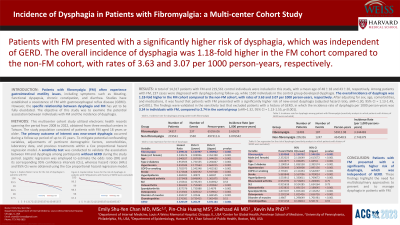Sunday Poster Session
Category: Esophagus
P0396 - Incidence of Dysphagia in Patients with Fibromyalgia: A Multi-Center Cohort Study
Sunday, October 22, 2023
3:30 PM - 7:00 PM PT
Location: Exhibit Hall

Has Audio

Shu-Yen Emily Chan, MD, MS
Weiss Memorial Hospital
Chicago, IL
Presenting Author(s)
Shu-Yen Emily Chan, MD, MS1, Kevin Sheng-Kai Ma, PhD2
1Weiss Memorial Hospital, Chicago, IL; 2Harvard T.H. Chan School of Public Health, Boston, MA
Introduction: Patients with fibromyalgia (FM) often experience gastrointestinal motility issues, including symptoms such as bloating, functional dyspepsia, chronic constipation, and diarrhea. Studies have established a coexistence of FM with gastroesophageal reflux disease (GERD) and irritable bowel syndrome (IBS). However, the specific relationship between dysphagia and FM has yet to be fully elucidated. Thus, the aim of this study was to examine the potential association between individuals with FM and the incidence of dysphagia.
Methods: This multi-center cohort study analyzed electronic health records from three medical centers in Taiwan spanning 2008 to 2022. The study focused on adults aged 18 years or older with FM. The primary outcome of interest was new-onset dysphagia during a follow-up period of up to 15 years. Adjustments were made for confounding factors using a Cox proportional hazard regression model. A sensitivity analysis validated the association between FM and dysphagia in participants without GERD. Logistic regression estimated the odds ratio (OR) and 95% confidence intervals (CIs), while Cox proportional hazard regression provided hazard ratios (HRs) and 95% CIs.
Results: A total of 14,317 patients with FM and 219,561 control individuals were included in this study, with a mean age of 48 ± 18 and 43 ± 20, respectively. Among patients with FM, 237 cases were diagnosed with dysphagia during follow-up, while1530 individuals in the control group developed dysphagia. The overall incidence of dysphagia was 1.18-fold higher in the FM cohort compared to the non-FM cohort, with rates of 3.63 and 3.07 per 1000 person-years, respectively. After adjusting for sex, age, comorbidities, and medications, it was found that patients with FM presented with a significantly higher risk of new-onset dysphagia (adjusted hazard ratio, aHR=1.30, 95% CI = 1.13-1.49, p< 0.001). The findings were validated in the sensitivity test that excluded patients with a history of GERD, in which the incidence rate of dysphagia per 1000 person-years was 3.34 in individuals with FM, compared to 2.74 in the control group (aHR=1.32, 95% CI = 1.13-1.55, p< 0.001).
Discussion: Patients with FM presented with a significantly higher risk of dysphagia, which was independent of GERD. These findings highlight the need for multidisciplinary approaches to prevent and to manage dysphagia in patients with FM.
Disclosures:
Shu-Yen Emily Chan, MD, MS1, Kevin Sheng-Kai Ma, PhD2. P0396 - Incidence of Dysphagia in Patients with Fibromyalgia: A Multi-Center Cohort Study, ACG 2023 Annual Scientific Meeting Abstracts. Vancouver, BC, Canada: American College of Gastroenterology.
1Weiss Memorial Hospital, Chicago, IL; 2Harvard T.H. Chan School of Public Health, Boston, MA
Introduction: Patients with fibromyalgia (FM) often experience gastrointestinal motility issues, including symptoms such as bloating, functional dyspepsia, chronic constipation, and diarrhea. Studies have established a coexistence of FM with gastroesophageal reflux disease (GERD) and irritable bowel syndrome (IBS). However, the specific relationship between dysphagia and FM has yet to be fully elucidated. Thus, the aim of this study was to examine the potential association between individuals with FM and the incidence of dysphagia.
Methods: This multi-center cohort study analyzed electronic health records from three medical centers in Taiwan spanning 2008 to 2022. The study focused on adults aged 18 years or older with FM. The primary outcome of interest was new-onset dysphagia during a follow-up period of up to 15 years. Adjustments were made for confounding factors using a Cox proportional hazard regression model. A sensitivity analysis validated the association between FM and dysphagia in participants without GERD. Logistic regression estimated the odds ratio (OR) and 95% confidence intervals (CIs), while Cox proportional hazard regression provided hazard ratios (HRs) and 95% CIs.
Results: A total of 14,317 patients with FM and 219,561 control individuals were included in this study, with a mean age of 48 ± 18 and 43 ± 20, respectively. Among patients with FM, 237 cases were diagnosed with dysphagia during follow-up, while1530 individuals in the control group developed dysphagia. The overall incidence of dysphagia was 1.18-fold higher in the FM cohort compared to the non-FM cohort, with rates of 3.63 and 3.07 per 1000 person-years, respectively. After adjusting for sex, age, comorbidities, and medications, it was found that patients with FM presented with a significantly higher risk of new-onset dysphagia (adjusted hazard ratio, aHR=1.30, 95% CI = 1.13-1.49, p< 0.001). The findings were validated in the sensitivity test that excluded patients with a history of GERD, in which the incidence rate of dysphagia per 1000 person-years was 3.34 in individuals with FM, compared to 2.74 in the control group (aHR=1.32, 95% CI = 1.13-1.55, p< 0.001).
Discussion: Patients with FM presented with a significantly higher risk of dysphagia, which was independent of GERD. These findings highlight the need for multidisciplinary approaches to prevent and to manage dysphagia in patients with FM.
Disclosures:
Shu-Yen Emily Chan indicated no relevant financial relationships.
Kevin Sheng-Kai Ma indicated no relevant financial relationships.
Shu-Yen Emily Chan, MD, MS1, Kevin Sheng-Kai Ma, PhD2. P0396 - Incidence of Dysphagia in Patients with Fibromyalgia: A Multi-Center Cohort Study, ACG 2023 Annual Scientific Meeting Abstracts. Vancouver, BC, Canada: American College of Gastroenterology.
